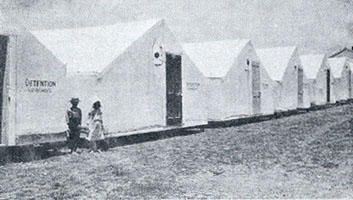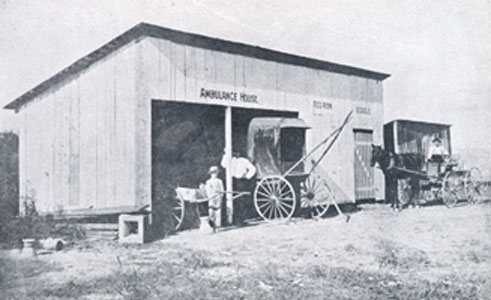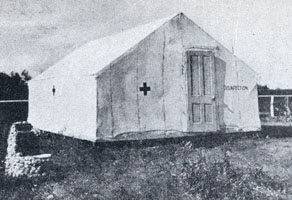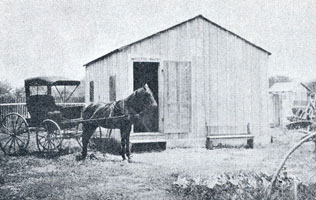Résumé of Experiments on Variola.
By CHARLES A. R. CAMPBELL, M. D.
San Antonio, Texas.
Mr. President and Members
of the Bexar County Medical Society:
There must be some motive for a member of the same professional household
to keep in the background such a work as I am about to present for your
consideration this evening. This motive is that I hoped some avenue might
present itself permitting me to continue the work to the point of carrying
out further experiments to such a degree of scientific certainty as would
place it beyond the possibility of contradiction. It was my ambition to
go into Mexico, where, with knowledge of the language and customs of the
people, I could have obtained the cooperation of the "powers that
be," and of the medical profession, and could there have completed
the investigation. There never was a doubt in mind that I could have had
this cooperation, as it was freely offered to me from that country, but
the lack of finance was the insuperable barrier.
As it is now my intention to publish this work, though I do not know when or where, I desire out of respect to my home professional brothers and home society to present it to you first.
The work of the Eradication of Malaria by the Cultivation of Bats, The Mosquitoes' Natural Enemy and Destroyer, on which I have been engaged, as you are all aware, for the past twenty years, is more important and far-reaching in its benefits to mankind than this work, and I purpose for the rest of my days to concentrate all of my energies, spare time, and money on the continued studies of that most benevolent, though misunderstood creature, the common bat.
I desire to return thanks before this Society to my good friend, Dr. W. L. Barker, who, appreciating my endeavors, had me placed in charge of the Pest House, where I found opportunities of pursuing this research on smallpox, which I could not have had without his kindly intervention. I also owe my thanks to Mr. Thomas Patino, my head nurse, who is a highly valued employee and most kind and sympathetic to the unfortunates under his care.
The papers in the order of their presentation are, "Resume of Experiments on Variola," "My Observations of Bed Bugs," and Dr. John Watts' valuable work and observations on this disease, which he presents under the caption of "Eradication of Smallpox without Vaccination or Disinfection." The author made Dr. Watts thoroughly acquainted with the result of his smallpox-bedbug investigation, on account of the Doctor's going to locate in Mexico, where the disease is so common, and requested him to continue the work in that country, on the lines indicated in the above mentioned papers. How well he carried on the investigation his paper will tell.
Some years ago, while traveling in Mexico, I learned that the Mexican mothers of the lower classes find a great deal of consolation when their children have had the small pox. They regard it as inevitable; and, in order to get through with this trouble as soon as possible, they place the well children upon the same bed as the one having the smallpox, so that they may become infected with the disease.
I was also told by these lowly people that those who sleep on the outside of the houses, upon nothing more, perhaps, than a sheep's skin or raw hide cot or bed, usually escape the disease -- hence the mother places the children who are well upon the same bed with the sick ones. This information was kept in mind by me until I had occasion to see a few cases in the City of San Antonio, Texas. In considering this malady, I quickly became impressed with two distinctive peculiarities of it, viz: Its being a disease of the winter and of the coldest climates, and that, as a rule, it is confined to the lower or filthy classes.
Having followed very closely the current literature concerning the brilliant work done by Drs. Reed, Carroll, and Agramonte in yellow fever, the above peculiarities caused me hypothetically to ascribe to the bedbug the quality of being the diffusing agent of variola. (As to the bedbug's power of resistance to intense cold, water, and starvation, see my "Observation on Bedbugs.")
Assuming that bedbugs are the only diffusing agents of this loathsome disease, then our present knowledge of its being "air-borne," or of its being transmitted by fomites, must be all wrong, therefore the principal work here mentioned is the demonstration of its non-contagiousness by means of clothing, bedding, hangings --in short, fomites.
I then began to experiment with this disease directly by contact and to expose some person to it who had not had it. I selected as this person one whose movements I could at all times control and understand, and, therefore, I chose myself. As even the air itself, without contact, is considered sufficient to convey this disease, and touching the clothes of a smallpox patient considered equivalent to contracting it, I exposed myself with the same impunity as my pest-house keeper, who is immune, having had the smallpox. After numerous exposures, made in the ordinary manner, by going from house to house where the disease was and demanding, under legal authority, the removal of the patients, as well as members of the family, to the pest house, I have never conveyed this disease to my family, or to any of my patients or friends, although I did not disinfect myself or my clothes nor take any precautions whatever, except to be sure that no bedbugs got about my clothing.
Another one of my experiments was thoroughly to beat a rug in a room, only eight or ten feet square, from which had just been removed a smallpox patient. This rug had been given to the negro family in question by a white person after his family had utilized it until it was useless for them, and thereafter it had been used for years by the said negro family. I beat this rug in the room until the air was stifling, and remained therein for thirty minutes. This represented the respiratory as well as the digestive systems as accepted avenues of infection. While I was exposing my person to this experiment of inhaling particles of organic, as well as micro-organic, matter, I never lost sight of the fact that I was engaged in trifling with the system of knowledge which had been handed down from generation to generation, each one accepting as true what the preceding one had written. I also remembered that, if such men as composed the scientific expedition to Cuba for the investigation of yellow fever had adhered to the old-time and accepted theories that bedding, carpets, clothing, hangings -- in short fomites --were the conveyors of yellow fever, we would not now have the knowledge which these gentlemen so nobly acquired and generously gave to the public in the interest of mankind, consequently I continued my experiments. After inhaling the dust from that rug, I examined my sputum microscopically the following morning and found cotton and woolen fibres, pollen, and comminuted manure, as also bacteria of many kinds.
Convinced that I had given my respiratory and digestive systems ample opportunities to afford avenues of infection, from that time on I mingled freely with my family, patients, and friends; but, for the first fourteen days after the experiment of beating the rug and inhaling the dust, I slept in my office for fear of conveying the disease to my family.
The next experiment was the exposure of two city carpenters, two laborers, and myself. Three of these men had never been vaccinated, and the fourth only in infancy. This experiment consisted in tearing down an old privy at the detention camp or pest house, which privy had been used four or five years by smallpox patients only. It was constructed of 1 x 12 inch slats and boards. With hatchets and levers the old structure was soon razed; and the foul-smelling lumber was carried by each of us a distance of one hundred yards and neatly re-constructed.
As the day was very hot and our water supply some distance from the work, I placed a bucket of water about ten feet from the work and in such a direction with the wind that the dust from the sawing and nailing of the old boards would fall into the water. Of course, the laborers did not observe my object in so doing, and they and myself all drank freely of the water till noon. After dinner all of us worked on that foul-smelling structure and drank of that same water till 'evening, when the work was completed. None of us ever felt any bad effects from our exposure. I had these men under my observation for fourteen days after this 'experiment.
In five instances where the disease made its appearance in the homes of negro washerwomen, I found two and three weeks' washing laundered and ready to be delivered to the owners. It is a matter of common knowledge that negro washerwomen, when ironing clothes, place them upon beds to keep them from becoming wrinkled, and these articles of clothing, when discovered in an infected house, are generally burned by the health authorities, the owners being reimbursed from public funds; but in each of the above instances I took the clothes to the pest-house grounds, and, spreading them upon the grass, I carefully searched each piece of clothing for bugs. Not being able to find any bedbugs on any piece, I returned all the clothing to the owners without any disinfection whatever. These clothes did not convey the disease to anyone. Anita H., a Mexican child, four years of age, never vaccinated and who had never had the disease, was taken to the pest house, where she took a baby out of the crib and played with it about four hours, hugging and kissing it and riding it in a perambulator around the grounds; but, although this baby was covered with pustules of smallpox, and although we took no precautions whatever (the girl's mother having agreed to this experiment), the girl did not acquire the disease.
J. C., brought to the pest house in a vesicular stage, made an uneventful recovery after passing through the typical states. In this case I caused the bed clothes of his bed to be undisturbed when he recovered. This same bed, without any change in the bed clothes, was then occupied by L. M. This individual had never been vaccinated nor had smallpox, and understood that he occupied this bed as an experiment. He did not acquire the disease.
P. H., a Mexican, vaccinated in infancy, who freely mingled with the smallpox patients in the discharge of his duties as night watchman at the pest house, keeping up the fires and remaining all night, did not contract the disease.
A. C., decidedly strumous, never vaccinated nor had the smallpox, freely mingled with smallpox patients in all of the stages, playing cards with them, eating and sleeping in the infected tents, and has continued to do so for more than two years.
Mrs. T. P., wife of the Pest-House keeper, aged26, vaccinated in infancy, acts as nurse and cook and freely mingles with the female patients.
Master E. P., and sister, aged respectively eleven and nine, the former vaccinated nine years ago, the latter unsuccessfully, play with children in all of the stages of smallpox and play with the toys of the little patients, without the least harm.
Personally, I have not only come into direct contact with smallpox patients many times, but have taken off and rubbed my outer clothes on the beds of the patients and then returned to the city and mingled freely with my family, friends, and patients, without disinfecting at all.
In one instance, which I believe is worthy of special mention, a man, his wife, and four children were here, and three of these children became infected with the smallpox. I took all of them to the Pest House, and as all of them preferred to stay in one room, I placed them together. The man and his wife had previously had the disease, and only one child escaped it. I kept them at the Pest House until the eighteenth day after the period of desquamation on the part of the case developing last. They were returned home upon a Saturday morning. Observe that this child, although living in the same room with the patients at the Pest House, had not acquired the smallpox, after being exposed to it all of the time for a period of six weeks; yet upon the fifth day after returning home, this child acquired the initial fever. I then examined their house and found it to be literally alive with bedbugs.
In addition to these experiments, it should be remembered that I had at the Pest House half a dozen employees, who washed, scrubbed tents, 'etc., and these persons were employed by me especially because they were non-immune -- and yet none of them ever contracted the disease.
Among some of the cases coming under my observation and care, which did not originate here, is the following. The patient, a girl of eleven years, had a fairly-developed case, and was at one of our hotels. I took this patient and her father and mother to the Pest House, in the meantime locking the door of the room at the hotel and leaving orders that no one be allowed to enter it until my return. This room had been occupied two days and nights by the patient. Upon my return I carefully inspected the bed and the entire room, particularly the walls and ceiling, and not finding any bedbugs, I told the hotel proprietor that the room was again all right; and it was from that time on occupied. All of the occupants were kept under careful observation, but not a case developed in any of the persons occupying the room.
Another case was that of a little girl who was seized by the disease in Mexico about eight hours before reaching San Antonio. This little patient's family consisted of her father, mother, and little brother, eight years old. I took them all (under protest) to the Pest House. The man I allowed to leave and go to the city and return, as he pleased; and, with my consent, he procured -a horse and buggy from a livery stable and took his wife riding every day. At night they went to the theatre, returning to the Pest House to sleep. He also bought a doll for the little girl; and she played with it, being at the time thoroughly covered with smallpox. She made a dress for this doll, slept with it at night, kissed it, and played with it continually, until about the fourth day, when she became displeased with it; and after some consultation, her father returned it to the store where it was purchased, and exchanged it for a larger doll. The clerk from whom the purchase was made was kept under secret observation for a long time, but nothing developed from the exchange.
A woman, returning from Mexico, stopped over in Eagle Pass to rest, as the "small of her back was nearly breaking in two;" she placed a plaster on her back to obtain relief, resuming her journey the next day. A day or two after her arrival in San Antonio she developed smallpox and was taken to the Pest House. The day being cold and the Pest House some distance from her room, she sent out and bought a fine blanket to cover herself on the road, using it as a shawl. On arriving at the Pest House, the room being nicely heated, she took the blanket off, placed it on a chair,and got into bed. One of the attendants overheard the keeper's wife ask her husband to bring her from the city a new blanket for their new baby, three weeks old. When he left the Pest House to get this patient, thinking the new blanket was the one intended for the new baby, he folded it up and brought it to the keeper's wife, who proceeded to wrap up her baby snugly in it. The mistake was not discovered for one week-yet the baby did not acquire the disease.
In the case of the woman, it is curious to note that the area of skin covered by the plaster already referred to, which had been left on the patient's back, was not attacked by the disease, the underlying skin remaining perfectly normal, although there was not a half inch square on her body that was not marked by the disease.
After making a great many of those experiments at the Pest House (it may be well to say that I had previously destroyed all the bedbugs) I procured a large flag-pole, with a large yellow flag, and made the occasion of the planting of the pole and the flag-raising a little feast-afternoon, with a banquet, to which were invited the City Council and the officers of the City Government. Liquid and solid refreshments were served, speech-making was indulged in, laudatory of the experiments, by some of the aldermen and other officials present, who knew well of the work I was doing. Evidently they must have had some faith in it, when they so gladly came to a Pest House (and almost in direct contact with smallpox patients) to attend a banquet and honor me by their presence. Some eighteen or twenty.,attended and remained two or three hours; one alderman in particular, who had never been vaccinated or had the disease, came in direct contact with a patient whose body was covered with the characteristic eruptions.
The most important observation on the medical aspect of this disease is the caehexia with which it is invariably associated and which is actually the soil requisite for its different degrees of virulence. I refer to the scorbutic cachexia. Among the lower -classes of people this particular acquired constitutional perversion of nutrition is most prevalent, primarily on account of their poverty, but also because of the fact that they care little or nothing for fruits or vegetables. That a most intimate connection exists between variola and scorbutus is evidenced by the fact that it is most prevalent among the poor or filthy class of people; that it is more prevalent in winter, when the anti-scorbutics are scarce and high priced; and, finally, that the removal of this perversion of nutrition will so mitigate the virulence of this malady as positively to prevent the pitting or pocking of smallpox.
A failure of the fruit crop in any particularly large area is always followed the succeeding winter by the presence of smallpox. My experience is limited to eighty-eight cases of that disease in the Pest-House, and my attention has constantly been directed to the establishing of the fact of the non-contagiousness of fomites and to the prevention of the pitting or pocking by the malady. That the pitting or pocking can be positively prevented I am absolutely certain, for in the above number of cases I had only one patient who became pocked and this was done intentionally. In all of the cases of smallpox that have originated here I have always found bedbugs; and where patients suffering with this disease were brought here and placed in premises free from these vermin, the disease did not spread to persons living with the patient. This has occurred in many cases, and in all stages of the disease.
|
"Disinfection" tent at San Antonio Pest House. The only disinfection done was to look for bedbugs in the clothing of the patients or those to be held in detention. |
The deluxe quarters of the Pest House: author's horse and buggy. |

Rows of tents for persons held in detention on account of having been exposed to smallpox.

Ambulance House, Feed Room, and Stable, connected with the San Antonio Pest House.

